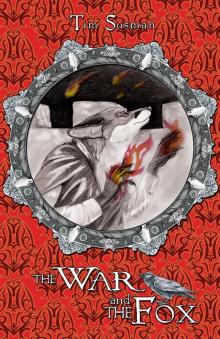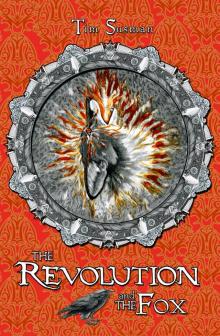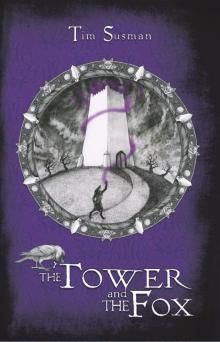- Home
- Tim Susman
The War and the Fox Page 12
The War and the Fox Read online
Page 12
“Not terribly well.” Kip took one of the pieces of fragrant bread from Emily. “Oh, rosemary.”
“I think so, yes.”
It was as good as she’d said it was, and sitting around and eating it together reminded Kip of their early days in the College. “So,” Emily said, “tell me about this battle of yours.”
They took it in turns to tell her about the battle and their own parts in it. When Kip came to tell her about burning the soldier, he gave more details than he’d yet given to Alice or Malcolm. She, after all, had been one of only two witnesses when he’d burned Master Windsor to death. “He stood there brandishing the musket, and I didn’t even think. There was fire, and I—I had to save myself. And a moment later the fire was—it was taking him. It wasn’t like Windsor, not as hot as that fire. There was still a body, and—and the smell—the smell was terrible.”
Emily took his paw gently. “This is war,” she said softly. “It’s terrible and yet necessary. Think of what lies at the end of the road.”
“I know,” Kip said, grateful for the reassurance. “But still, it’s a life I took. Windsor I can justify, but…”
“We all did.” Alice’s voice was small but firm. “Some of the things I did might not have directly killed people, but people died all the same.”
“Still.” Malcolm kept the usual cheer in his voice. “The sooner we end this war, the sooner we can all stop with the necessary evils, aye?”
“Yes, good.” Emily rose. “I’m not supposed to tell you where our next destination is, but—”
“Then don’t,” Kip said. “We’ll trust that you’re safe and that this time you’ll be more successful.”
“And you,” she said, “keep fighting those battles.”
Emily embraced Malcolm and then stepped back and was gone.
None of them spoke for a moment, and then Kip gave a low whistle. “I wonder when Victor went to the British side.”
“Can’t say you’re surprised, can you?” Malcolm sat on the floor. “Little parasite attaches himself to wherever he perceives power to be. Reckon he believes the British can win this war. I wouldn’t be surprised if he had something to do with the attack on the College.”
“Curse it!” Kip smacked a fist into his paw. “I meant to ask Emily to try to reach Master Argent. With Plainfield, she might be able to do it.”
“It doesn’t sound as though Plainfield or any of them is much disposed to diverting from their mission.” Malcolm crossed his arms.
“What happened to Victor this last year?” Alice asked. “I haven’t heard you speak of him, and I thought that perhaps after…what happened, he might have left the school.”
“No such luck.” Malcolm gave a theatrical sigh. “Not as long as Patris was there, which some say was longer than he should be as well.”
“Not as long as his father has money, more to the point,” Kip said.
At this point Captain Lowell came back into the room, but none of the three got to their feet. “I have managed to avoid hearing inappropriate state secrets,” the man said stiffly. “Mostly. I trust all is well with Miss Carswell.”
“As well as can be hoped,” Malcolm said cheerily. “How was the hallway? Didn’t go get a bite to eat, did you?”
“I did not,” Captain Lowell replied. “Though I imagine we are all hungry.”
“Our friend’s brought us some Spanish bread, so we’re fine.” Malcolm held up his last piece and ate it.
Kip had finished his and now felt slightly guilty that he didn’t have some to offer Captain Lowell. Jackson’s lackey he might be, but he’d also fought beside them and worked to save their lives, and he’d spared Kip a reprimand for disobeying orders.
But Captain Lowell didn’t seem to mind. “Plain Boston bread will be fine,” he said. “That way I don’t have to wonder where this delicacy came from. Are you coming to dinner?”
“In a moment,” Kip said. He did not feel that he could face cooked meat quite yet. Neither Malcolm nor Alice rose, and in fact Alice pointedly took out one of her spell books, so Captain Lowell shrugged and left the room again.
For a short time, they all sat in silence. “It was good to see Emily again,” Kip said finally.
“Aye.” Malcolm grinned. “And to hear and feel her too.”
“Of course.” Kip flicked his tail.
Alice studied her book, whiskers twitching. Kip wasn’t sure she was listening, but then she said, “Emily’s doing the best she can, and so are we.”
“Of course. What spell are you studying?” he asked, though he was sure he knew the answer.
He was right. “Summoning,” Alice said. “I really think I can master it. Can we try it now?”
“Go ahead.” Malcolm sat up straighter. “I can prepare a binding in case something goes wrong.”
Malcolm’s senses were good, Kip had no doubt, but without sight, would his reactions be slowed? He could summon Daravont to help him see, but then he would be binding one demon already, and it had taken Kip a year to learn to hold a binding on Nikolon while summoning another demon. Of course, Alice would only be summoning an elemental, but Malcolm had had little experience with those. It had been difficult enough to get him to summon a demon.
“I don’t know what air elementals can do,” Kip said finally. “If it gets loose, it might just vanish out the window. Or it might pull the air out of the room to suffocate us. Or it might blow through the building and knock it down.”
“You said elementals aren’t usually malevolent.” Alice pointed. “The book says so too.”
“They’re not. But sometimes they can be exuberant or unaware of what they’re doing. They probably won’t try to kill us, but…imagine a phosphorus elemental running around through this house. It would be a disaster.”
The young vixen exhaled, then bent to her book, her ears back. She mouthed the words of the spell to herself and then said, “Were you this careful when you were learning magic?”
“No.” Kip considered his words, conscious of the edge to Alice’s voice. “But I didn’t have anyone I trusted teaching me, and I learned how much damage a sorcerer can do. I told you about Master Cott burning that building with the man in it.”
Alice shuddered. “I’m not using fire. I don’t even like it that much.”
“Fire’s only the most spectacular example,” Kip said. “Any magic can do as much harm.”
“There’s a reason fire sorcerers are prized in battle, though,” Malcolm said.
Which reminded Kip of that morning, and he winced. Malcolm didn’t see the motion, but Alice did, and her ears came up. She padded to Kip’s side and put a paw on his. “You did what you had to do.”
“I know,” Kip said. But that didn’t help the memory: the soldier had been there in one moment and gone the next, dead in an instant. He hadn’t been evil like Windsor; he’d been fighting for a cause he believed to be just. He would’ve killed Kip given the chance, of course, wouldn’t he? That was what Kip had to believe, that in that moment his choice had been to kill or be killed. That was war; that was what Captain Lowell and Master Colonel Jackson had been telling him. He knew that, but the information had yet to make it to his heart.
Alice waited a moment by his side and then said with attempted cheer, “How about some dinner, then?”
“You and Malcolm go ahead,” Kip said. “I’ll get something later, maybe.”
“You need to eat.” Malcolm got to his feet.
“Aye, but…in a bit.”
Alice looked at him another moment and then walked across the room to take Malcolm’s hand. “We’ll bring you back something,” she said, and the two of them left Kip alone with his thoughts.
Two days passed without further word from Emily or from their commanders. They saw Jackson only once, at one of the meals, with a harried-looking Callahan by his side. “He’s Jackson’s personal assistant now,” Lowell told them. “Ferries him from meeting to meeting.”
Kip would have taken that job i
f he were capable of it. At least then, he thought, he might have some idea of what was going on with this war. They heard scraps of information: the British ships had left Boston Harbor but anchored just offshore; the British Army was regrouping for another assault; a British force was making its way along the Road from Bristol to New York. It seemed that most of the fighting was concentrated around the northern colonies, which left Kip with the hope that his parents in Peachtree might be spared this war.
The mention of the Road in New York gave him another place to focus his attention: he’d never seen the Great Road that spanned the ocean, the closest Great Feat of sorcery to America, with the obvious exception of the Calatians themselves. What would it be like to stand on this road in the middle of the ocean, a great expanse of sea water all around him? Would it be a path of dirt? Would he be able to feel its magic? Having lived among one Great Feat his whole life and embodying part of it did not inure him to the excitement of witnessing others.
Distractions like this one slowly worked the sight and smell of the soldier he’d killed away from the forefront of his thoughts. He reminded himself often of one of the lessons Cott had taught him: that guilt for a fire sorcerer could mean paralysis and death. “We’ve a destructive power in us,” he’d told Kip, “and sometimes despite our best efforts, that power will out. If we’re to use it at all, we must make peace with that. It will happen and we must forget it as easily as we can, or it may abandon us when we need it most.”
Facile words, Kip thought, from someone who’d terrified a man by burning his office around him, but it was true that that man was never in serious danger, not unless he’d run into the flames. Certainly Cott must have had incidents in his past that he hadn’t shared with Kip. After all, he’d been the Empire’s leading and only (to Kip’s knowledge) fire sorcerer during the Napoleonic Wars. He’d never talked about war, though. Cott preferred to be left alone in his office to research fire, and Kip couldn’t imagine him under orders the way Kip was now. Cott, he thought, would as soon set Jackson on fire as any enemy soldier, though he couldn’t imagine his old mentor doing either.
The British soldier was dead and he was not. If he was going to be of any use to the American army, he might have to kill again. He could try his best to avoid that situation, but he would have to be ready for it. There were times, though, when he came close to wishing he had taken Emily’s offer to accompany her.
Alice, forbidden to practice summoning, worked on her physical magic every day with a drive that reminded Kip of his own first year. Malcolm continued to study with the other defensive military sorcerers, learning from them and teaching them in turn. The Inattention wards, ones he had not paid particular attention to, proved useful, and he grew steadily better at them.
Often he practiced casting the wards so that Kip and Alice would not be affected by them but Captain Lowell would. This resulted in some amusement on their part, and one evening after Alice had teasingly asked him, “Where’s Malcolm?” and giggled at his confusion, Lowell glared at her.
“Like it or not,” he said, “we are bound together as a unit. Of course you may have your jokes on me if you like, but I would prefer it if you treated me with respect.”
Malcolm dispelled the ward then. “That’s fair,” he said, “but come now. We know almost nothing about you. I like to get to know a fellow before we get ‘bound together.’”
“My rank is all that should matter.” Lowell looked around at the three of them. “This is the army, not a supper club.”
“You’re more than simply a captain, though.” Kip sat on the chest of drawers near the window, behind Alice in one of the chairs.
Lowell rested his hand on the back of one of the chairs. For a moment he seemed about to leave the room, and then he sat down stiffly. “I was raised in Georgia and freed at the age of ten on the death of my former owner. My uncle and I came north to New York and made our fortune, and when I turned eighteen I enlisted in the Army. I’ve served ever since.”
“What did you make your fortune in?” Kip asked.
“Carpentry. My uncle has a genius for it that sadly I did not inherit. We worked in a shop owned by a generous white man who could sell pieces to wealthy patrons who would never have bought from us directly. He gave us a very fair share of the profits and helped me acquire an education.”
“My father got a spell book for me from a sympathetic master,” Kip said. “That’s how I first learned enough magic to get into the College. They’d never have allowed me in otherwise.”
Lowell nodded. “We who found generous patrons are lucky enough to be allowed to advance a little more than others of our kind.”
“It’s no Greek saga,” Malcolm said, “but yours is a noble story nonetheless.”
“You think so?” Lowell asked, and even though Malcolm couldn’t see his glare, the tone of his voice kept the Irishman quiet.
The following day as Kip practiced his translocation, the idea came to him to ask Captain Lowell if he would be a test subject for the spell. This ability seemed the most important for him to improve in, but every time he translocated Malcolm or Alice, it disrupted their equally important practices.
The captain demurred at first, but after Kip had demonstrated his ability and promised there would be no jokes played, grudgingly agreed. Only afterwards did Kip realize what a measure of trust that was, not only to allow Kip to perform spells on him, but to trust that the fox wouldn’t send him to Peachtree or London or somewhere else remote that he’d never come back from. He only sent Lowell to the ground floor, the roof, and other places inside the Trade House, growing more confident with every success.
After one of those sessions, they sat on the roof together looking over the harbor in the pleasant evening breeze, and Kip thought of a possible solution to his dilemma. “Captain,” he said. “I understand that I’m to come to you with—problems?”
Lowell nodded. “You may.”
Kip took a breath. “I know that we’re at war, and there are necessities, but…I can’t stop thinking about that man I killed.”
Now the captain turned to face him. “One never forgets the first time one takes a life,” he said quietly. “Those are the harsh realities of war. The killing can get easier if you allow it. Whether that is a course you wish to pursue is yours to decide.”
“I don’t,” Kip said quickly. “I wonder if you might be able to request of Master Colonel Jackson that we be used more strategically? Not in direct combat, I mean.”
Lowell met Kip’s eyes. “I feel the need to remind you that had you followed orders, you would not have faced that soldier. Your own recklessness put you in that position.”
Kip flattened his ears. “I know. Sir.”
The captain turned his gaze back out to the ocean and breathed in the salt air. “That said, I believe you may be correct that your abilities could be put to better use than incinerating single soldiers. I will make the suggestion to Master Colonel Jackson. Although,” he said, “the Master Colonel is not known for his democratic style.”
When their new orders came, they were not in the northern colonies—northern part of America, Kip forced himself to think. Master Colonel Jackson summoned them to a meeting in the dining room to tell them that they were being called to defend Savannah. The port, important to the British trade routes to the Caribbean, had swarmed with activity over the last week and the American command had confirmed that a fleet was heading for Savannah—they were due to arrive that day, and the short notice was because the spies had to make sure the ships were not going to Charleston.
After sunset that evening, the translocational sorcerers came to move all the units to Savannah. Though they were brought indoors, the air pressed in on Kip, warm and humid, as soon as he appeared. The air felt familiarly thick, but even more humid than he’d experienced in Peachtree, and accompanying the humidity was a thick briny smell of ocean. He, with Alice, Malcolm, and Lowell, were shown to the third floor of a modest house and into a room half t
he size of the one they’d had at the Trade House. Four cots lay evenly spaced on the ground and there was no screen for Alice to have privacy. There was, they found, a linen closet in the hallway which was large enough for Alice to change her clothes in when necessary, so they removed the shelves and assigned the room that purpose.
Master Colonel Jackson assembled them in the large ground floor room of this house to explain the situation in Savannah. The British had taken over a good portion of the town, including the small Calatian neighborhood, and the American forces had been attempting to dislodge them for two weeks with little success. Only one military sorcerer unit had been deployed here because it wasn’t a pitched battle yet, but the ships no doubt carried reinforcements both magical and non. If the British were able to take Savannah, they would have a strong foothold in the southern part of the country.
What Jackson did not mention was that directly upriver of Savannah lay Peachtree. If Kip failed to protect Savannah, his parents would be left vulnerable. He did not think Jackson would allow him to leave the army to protect Peachtree, not when there was no college of sorcery there anymore, so he would have to do everything in his power to keep Savannah in American hands.
They had a day, maybe two, before they estimated the ships would be in range of the harbor. Even before the arrival of the ships, the Americans were at a disadvantage; many of the Royal Army here had remained loyal to the Empire and had helped hold part of Savannah for the British.
“Now,” Jackson told them, “you’ll be able to use calyxes here, so prepare your demon summoning and let’s go out in the morning and drive them down to the docks so when the ships arrive, they’ll be forced to board and go back to sea. If we keep the British on the waves, they can’t occupy our land.”
Murmurs of agreement from the men followed them out of the room. Kip, with Malcolm’s hand on his arm, had risen to join them when Jackson said, “Penfold. A word.”
Kip and Malcolm both turned, Alice and Lowell a step beyond them. “Just Penfold,” Jackson said.

 The War and the Fox
The War and the Fox The Demon and the Fox
The Demon and the Fox The Revolution and the Fox
The Revolution and the Fox The Tower and the Fox: Book 1 of The Calatians
The Tower and the Fox: Book 1 of The Calatians